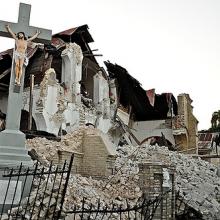Mennonite
ONE SUNDAY EVENING during high school, friends from my Mennonite church and I drove around Lancaster County, Pa., stealing mattresses. Bored by too many evenings of roller skating and Truth or Dare, we, like teenagers everywhere, landed on thievery as the solution to adolescent ennui. Having found out which of our friends were away from home, we showed up at their houses, told their parents about our prank, and swore them to secrecy. Then we clomped up narrow staircases to their sons’ and daughters’ bedrooms and wrestled mattresses back downstairs and onto the bed of a pickup truck. Just before our getaways, we left notes on our friends’ dressers, signed with what we thought was a most clever alias: “The Mennonite Mafia.”
We had no idea that 25 years later, Amish Mafia would be a blockbuster reality show, its first episode attracting 10 times more viewers than there are Amish people. Had you told us then that a bunch of Amish and Mennonite kids growing up a few miles away would someday parlay boredom-induced shenanigans into a hit cable TV series, I don’t know whether we would have been flattered or jealous. Kate Stoltzfus? Rebecca Byler? Lebanon Levi? People with names like these—our “plain-dressing” Amish neighbors and the more conservative Mennonite kids we went to school with—were the butt of our jokes, not the cynosures of popular culture.
Only a few decades after we and our families exited the conspicuous conservatism of plain Anabaptism, mass culture is flocking toward it. From Amish-themed reality TV shows to Christian romance novels with Amish characters and settings, the media have finally landed the lucrative Amish account, although the furniture industry and “Weird Al” Yankovic’s “Amish Paradise” got there first. Americans’ enthrallment with the Amish—and schadenfreude about their sometimes wayward youth—has rarely been more intense.
One of the U.S. Constitution's difficult balances is found in the freedom of religion clause of the First Amendment:
“Congress shall make no law respecting an establishment of religion, or prohibiting the free exercise thereof …”
What happens when those two values conflict?
That is the issue with the controversy over whether religiously-affiliated organizations should be required to offer free coverage for contraception in health insurance plans made available to employees. Those opposed — most notably Catholic organizations — claim that this requirement would violate their freedom of conscience. Those who support it claim that exempting religiously-affiliated organizations would establish a religion over the rights of individuals.

Port-au-Prince church post-earthquake. Photo by Colin Crowley via Wylio http://www.wylio.com/credits/Flickr/4293703467
How does one dig out from under such tragedy? How does one have hope for a better life, for a new Haiti?
In a meditation titled "The Gates of Hope," Minister Victoria Safford writes:
"Our mission is to plant ourselves at the gates of hope -- not the prudent gates of Optimism, which are somewhat narrower; nor the stalwart, boring gates of Common Sense; nor the strident gates of self-righteousness ... nor the cheerful, flimsy garden gate of 'Everything is gonna be all right,' but a very different, sometimes very lonely place, the place of truth-telling, about your own soul first of all and its condition, the place of resistance and defiance, the piece of ground from which you see the world both as it is and as it could be, as it might be, as it will be; the place from which you glimpse not only struggle, but joy in the struggle — and we stand there, beckoning and calling, telling people what we are seeing, asking people what they see."
Indeed, we need to plant ourselves at the gates of hope and work toward a just peace, on Earth as it is in heaven.
Albania was perhaps the most closed society in the world during the Cold War, with absolutely ruthless persecution of all religion. Churches were destroyed in every corner of that country. Clergy were eliminated. Worship was outlawed. And enforcement was brutal.
When Communism fell, and the country opened for the first time in decades, the Albanian church began a miraculous process of rebirth. We heard the moving story of the Albania Orthodox Church, rebuilding countless church structures, but even more importantly, restoring faith in the hearts of its people. I've known its leader, Archbishop Anastasios, from past encounters at the World Council of Churches, and he surely is a saint. The revival of religious faith in Albania and its compassionate service to those in need is a magnificent story of the church's witness, and the Spirit's power.
 Most of my friends knew evangelicalism only through the big, bellicose voices of TV preachers and religio-political activists such as Pat Robertson, the late Jerry Falwell and James Dobson. Not surprisingly, my friends hadn't experienced an evangelicalism that sounded particularly loving, accepting or open-minded.
Most of my friends knew evangelicalism only through the big, bellicose voices of TV preachers and religio-political activists such as Pat Robertson, the late Jerry Falwell and James Dobson. Not surprisingly, my friends hadn't experienced an evangelicalism that sounded particularly loving, accepting or open-minded.
After eschewing the descriptor because I hadn't wanted to be associated with a faith tradition known more for harsh judgmentalism and fearmongering than the revolutionary love and freedom that Jesus taught, I began publicly referring to myself again as an evangelical. By speaking up, I hoped I might help reclaim "evangelical" for what it is supposed to mean.
 If you live in Kentucky, Nevada, or Ohio and listen to Christian or country radio, you'll be hearing some of Sojourners' new radio ads calling for legislators to remember the least of these during this default crisis. For those of you who haven't completed your migration over to Google+, you might also start to see some ads popping up on your Facebook page in the next few days asking you to speak out on behalf of those in need. The reason we are running these ads is simple: The rich have lobbyists while those in need don't, and that's why Christians need to speak out and form a "Circle of Protection." If you don't live in one of these areas (or aren't listening to Christian or country radio) you can listen to the ads here.
If you live in Kentucky, Nevada, or Ohio and listen to Christian or country radio, you'll be hearing some of Sojourners' new radio ads calling for legislators to remember the least of these during this default crisis. For those of you who haven't completed your migration over to Google+, you might also start to see some ads popping up on your Facebook page in the next few days asking you to speak out on behalf of those in need. The reason we are running these ads is simple: The rich have lobbyists while those in need don't, and that's why Christians need to speak out and form a "Circle of Protection." If you don't live in one of these areas (or aren't listening to Christian or country radio) you can listen to the ads here.
My friends and I can be stupid. Add explosives to the equation and the idiocy quotient increases exponentially. Such was the case every 4th of July during high school. A group of about 20 of my friends and I would get together to barbecue and play with illegal fireworks. At any unsuspected moment while taking a bite out of a burger, an M-80 could be lit under your seat, a sparkler thrown at your chest like a dart, or a mortar could be shot like a bazooka, catching bushes on fire. These chaotically stupid memories simultaneously serve as some of the most fun I can recall experiencing. So for me, Independence Day equals fun.
However, there's a deeper reality to this holiday. Only about three years ago did I realize that in celebrating Independence Day, I'm also glorifying the roots on which this nation was founded: an unjust war. The "rockets red glare" and "the bombs bursting in air" remind us not of the day God liberated the colonies, but of the moment in history when our forefathers stole the rhetoric of God from authentic Christianity to justify killing fellow Christians. There's two reasons I'm convinced that celebrating Independence Day celebrates an unjust war.
The scenes were stunning: Hundreds of demonstrators pouring across the fence between Syria and the Israeli occupied Golan Heights.
Last Friday, at a protest against the Israeli separation barrier in the West Bank town of Bil'in, Palestinian nonviolent activist Jawaher Abu Rahmah was killed by http://www.google.com/url?q=http%3A%2F%2Fmondoweiss.net%2F2011%2F01%2Fde...


